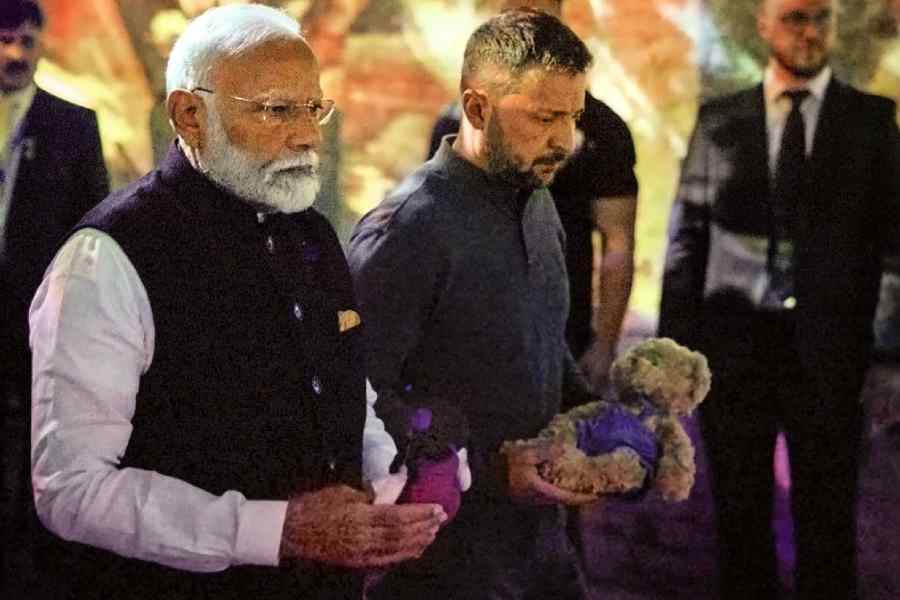Prime Minister Narendra Modi on Friday underscored India’s involvement in several peace initiatives to resolve the Russia-Ukraine conflict, maintaining that India was not neutral but on the side of peace.
He was speaking in the presence of Ukrainian President Volodymyr Zelensky ahead of their bilateral engagement in Kyiv, six weeks after having travelled to Moscow for a lengthy meeting with Russian President Vladimir Putin.
With his short trip to the Ukrainian capital on a special train from Poland on Friday morning, Modi became the first Indian Premier to visit the East European country after the establishment of diplomatic relations in 1992.
He is also seen as one of the few world leaders to have engaged with both the principal adversaries in this prolonged conflict.
In his remarks at the Mariinskyi Palace — the official residence of the Ukrainian President — Modi said: “We have with great conviction stayed away from war… but it does not mean we are neutral. From day one we have been on the side of peace.
“We come from the land of Buddha which has no space for war. We come from the land of Mahatma Gandhi who gave the message of peace to the entire world.”
There was no indication from the Ukrainian side if this had convinced Zelensky, who had been scathing in his criticism of Modi a month ago on seeing the Prime Minister hug Putin in Moscow on a day the Russians bombed a children’s hospital.
The hug was frowned upon in Western capitals, but external affairs minister S. Jaishankar shrugged it away as a reflection of cultural differences.
Asked about the hug at the media briefing on the Ukraine visit, Jaishankar said: “In our part of the world, when people meet people they are given to embracing each other. It may not be part of your culture but I assure you, it is a part of ours.
“In fact, today the Prime Minister also embraced the Ukrainian President and I have seen him do it in a number of places with otherleaders.”
Providing an Indian assessment of the Ukrainian position following Friday’s talks, Jaishankar said: “They clearly wanted continued involvement of India with the global peace summit on Ukraine. There was also a discussion about what could be effective ways of taking these discussions forward, not necessarily within the format of the summit. There are obviously multiple possibilities here and multiple views about those possibilities.”
A substantial part of Friday’s bilateral engagement dwelt on the conflict, and the Prime Minister also spoke about his discussions with Putin in Moscow.
“The Prime Minister spoke about our position. He shared the widespread sentiment in the global South about the repercussions of this conflict for them….” Jaishankar said.
“He sought President Zelensky’s assessment, both of the ground situation as well as of the diplomatic scenario. President Zelensky spoke at some length about both issues.”
The joint statement reflected India’s position on the conflict. “Prime Minister Modi reiterated the need for sincere and practical engagement between all stakeholders to develop innovative solutions that will have broad acceptability and contribute towards early restoration of peace. He reiterated India’s willingness to contribute in all possible ways to facilitate an early return of peace.”
Jaishankar reminded the media that India had been actively associated with various peace efforts led by various countries since the conflict began in February 2022.
“We supported the Turkish effort in 2022 to open up the Black Sea Grain Corridor,” he said.
In September 2022, he underlined, India was sought out during the crisis around the Zaporizhzhia nuclear power plant.
“It was a matter on which we have thereafter been directly in touch with the Russians and then back to the Ukrainian side….” Jaishankar said.
Responding to a question, he said Zelensky had brought up the subject of the exponential rise in Indian imports of Russian crude.
“We explained the energy market scenario. The fact that many energy producers are sanctioned — making the market very tight — and why actually today there is a compulsion and (it is) in the interest of the international economy as a whole that oil prices remain reasonable and stable,” Jaishankar said.











